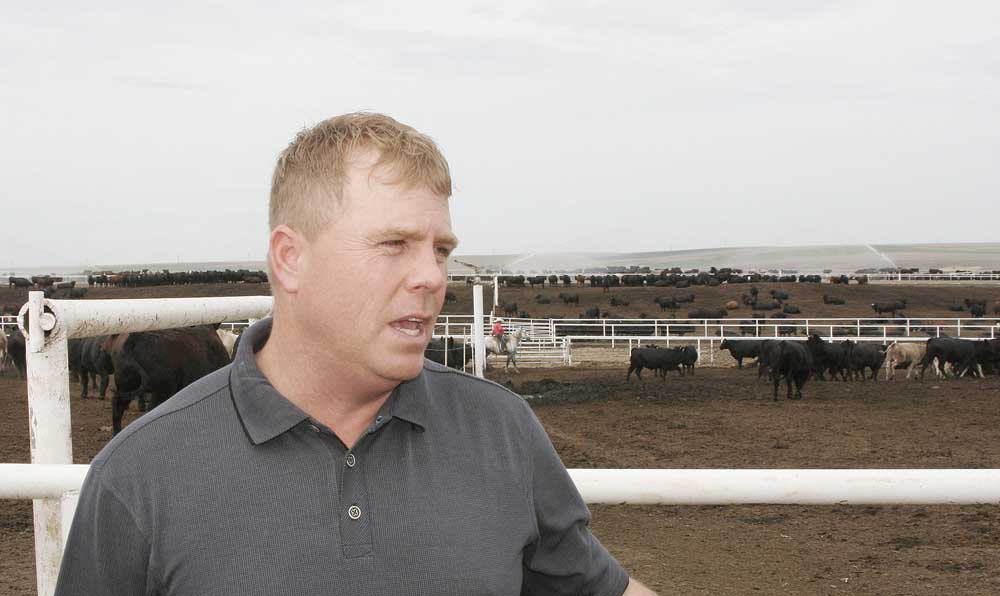Tyson calls Easterday’s multimillion-dollar claims ‘imaginary’
Published 3:30 pm Monday, October 3, 2022

- Cody Easterday talks about receiving and preparing livestock on the Easterday Farms feedlot for Tyson Foods in Pasco, Wash., during the Washington Beef Commission's Explore Beef Experience tour June 1.
Tyson Fresh Meats shot back at Cody Easterday’s claim that the company owes him nearly $163 million, alleging the ex-cattleman was trying minimize Tyson’s losses and reduce his sentence for fraud.
The alleged offsets, stemming from Easterday’s business dealings with the meat packer, would nearly wipe out the $170.5 million that he still owes the company in restitution.
The balance could be covered by payments due in two years agreed to in bankruptcy court by other Easterday family members.
Tyson, in a brief filed Friday in the U.S. District Court for Eastern Washington, accused Easterday of concocting “imaginary” claims so he can argue for a shorter term under sentencing guidelines.
“That transparent attempt cannot be allowed to succeed,” according to Tyson’s brief. Efforts to obtain comment from Easterday’s attorney, Carl Oreskovich, were not successful.
Easterday, 51, was to be sentenced Tuesday in Yakima for defrauding Tyson out of $233 million and Segale Properties out of $11 million. He pleaded guilty last year and agreed to make restitution.
Easterday helped liquidate his farming empire this year, recouping $62.4 million for Tyson and $3.5 million for Segale, a Tukwila, Wash., developer that invested in cattle raised by Easterday.
The Justice Department recommended a prison term between 10 years, one month and 12 years, seven months, primarily based on the size of the theft. Easterday still owes his two victims a combined total of $178.1 million, according to U.S. attorneys.
Easterday argues restitution should be reduced by what Tyson owes him.
He claims Tyson owes $100 million for using him in a marketing venture, $51 million for violating the Packers and Stockyards Act of 1921 and $11.97 million in unpaid cattle feeding bills.
Tyson dismissed the claims as “wishful pleading.”
Tyson described the marketing campaign as a “short term and ultimately not very successful co-branding effort in Japan.”
The campaign involved Japanese company Nippon Ham and promoted “Cody’s Beef” to Japanese buyers. Easterday claims he wasn’t paid for the use of his name or a share of the profits.
The Packers and Stockyards Act regulates transactions between cattle sellers and meat packers. Easterday alleges Tyson collected illegal fees on cattle delivered to Tyson’s beef plant in Pasco.
Tyson called the allegations “desperate and intentionally misleading.” The company also maintained it negotiated a deal that covered the cost of feeding cattle.
Easterday contracted with Tyson and Segale Properties to procure and raise cattle. Segale advanced money with a guaranteed return of 4%. Tyson got cattle for its Pasco beef plant.
Between 2016 and 2020, Easterday billed for more than 200,000 head of cattle that didn’t exist. Easterday used a portion of the proceeds to cover losses totaling about $200 million from betting on the Chicago Mercantile Exchange.
The court has sealed reports from mental-health experts who interviewed Easterday. According to excerpts quoted in available records, Easterday was diagnosed with a gambling addiction.
Family, friends and business associates have written letters to U.S. District Judge Stanley Bastian, who was to sentence Easterday. The letters praise Easterday’s character and community contributions.
Oreskovich has asked that Easterday be put on probation for three years. U.S. attorneys say that such a large theft demands a stiff prison sentence.
U.S. attorneys say they have no position on the financial dispute between Easterday and Tyson, but do not want it to delay Easterday reporting to prison.







